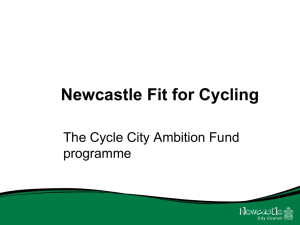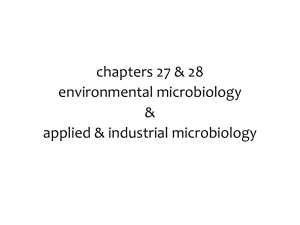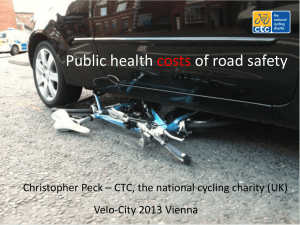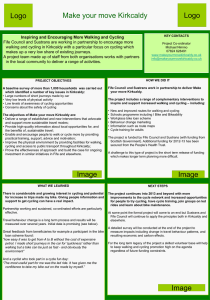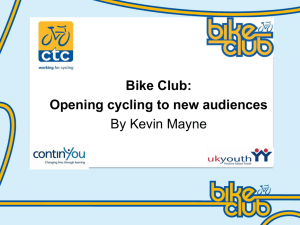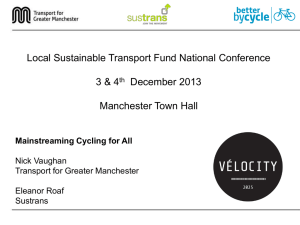Cycling in Lower Austria – The Campaign
advertisement
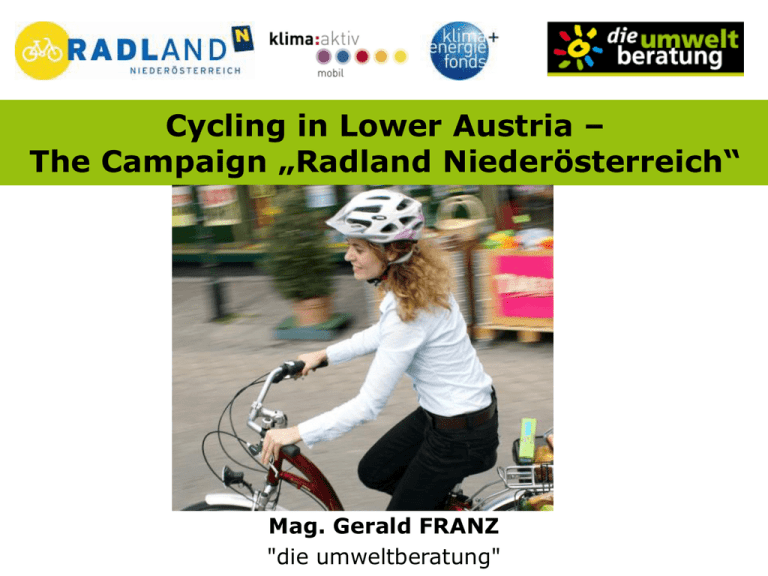
Cycling in Lower Austria – The Campaign „Radland Niederösterreich“ Mag. Gerald FRANZ "die umweltberatung" Contents Overview of Lower Austria Traffic and cycling in LA Aims of the campaign RADLand Target groups and partners Review 2007 – 2011 Pros and cons Planned measures 1 special project Resume Overview of Lower Austria Largest of 9 Austrian States 5 Main regions encircling Vienna 21 Districts 573 Municipalities 1,6 Mio. Inhabitants 19.178 km2 Many commuters Traffic contributes more than 25% of CO2 emissions Traffic in Lower Austria 1 • Modal Split 2008 Preferred Mode of Transport in Lower Austria (Working Day) Walking Cycling Car as a Driver Car as a Passenger Public Transport 2/3 go by car daily! 95% of all households hold a car! Traffic in Lower Austria 2 • Travelling Distances 2008 Travel Distances of Lower Austrians on a working day Almost half of all travels are shorter than 5 km! Everyday cycling in Lower Austria Communities responsible for cycling policies 7% use bycicle for daily travels Cycling more popular in leisure than in everyday life Average km cycled in a year: 184 Aims of the Campaign RADLand Politically initiated Coordinated with the climate program Ongoing since 2007 Target is to increase cycling in everyday life significantly by a bundel of measures Target groups Lower Austrian Municipalities - Consulting, training, campaigns, financial support!! Schools and Educational institutions - Awareness raising, games and actions Lower Austrian People - Awareness raising, information Partners involved Government of Lower Austria Büro Praschl – Advertising agency Klimabündnis – Environmental NGO Dorf-und Stadterneuerung – Association for village an town renewal Regional management "die umweltberatung" - Environmental consulting and training NEW: Lower Austrian Tourism Agency Intended: Bicycle shops, businesses Review RADLand 2007 – 2011 / 1 • Overview of measures (Municipalities): Cycling events (Radlrekordtag – Cycling Record Day) Cycling conferences (RADLGipfel) Galas for Mayors Free information and consulting municipalities (checklists) Support of key projects and awareness raising measures in municipalities Training programs for cycling representatives in villages Review RADLand 2007 – 2011 / 2 • Overview of Measures (Schools): Cycling courses in cooperation with AUVA (association for accident prevention) Bicycle repair courses ("die umweltberatung„) Game and competitions „Kilometerradeln“ (collecting kilometers cycled ) (Klimabündnis NÖ) Give aways Bicycle backback Review RADLand 2007 – 2011 / 3 • Overview of Measures (Population): Bike hotline, exhibition stands Give aways Bicycle parties and festivals Broschures and information Games and contests Special bicycle edition sponsored by Local Government Bicylces to hire (Leihradl next bike) Bike wardrobe Fotos Review RADLand 2007 – 2011 / 4 • Overview of Measures (Communication): Webpage Media articles and radio spots Broschures Poster campaign Tip on cards Competitions (bikes to win) Roll-Ups, banners, beach flags Pros and Cons • Results Networking and cooperation Cycling as a positive subject Risen interest by target groups Share of cycling is stable • Challenges Low community Budgets Low communication Budget – little publicity Deficits in cycling infrastructure Weak cooperation with businesses Planned Measures Continuation of the campaign Closer cooperation with tourism Focus 1: Traffic safety Focus 2: By bike to work (National campaign) Target: Double Cycling in Lower Austria – 14% (within 10 years) Strategy: Intense consulting and monitoring for Regions / Communities 1 Special Project (Adult Education) Survey: Cycling in Vorarlberg and Lower Austria Mayors and the members of municipal councils from LA visit good-practise villages Representatives from villages in Voralrberg go to LA (observing cycling infrastrucutre, advice) Encounter at the same level and talking about problems and possible solutions Agreeable setting – „Learning by cycling“ New contacts, fun factor, … What is the difference to Vorarlberg? Civic participation Overall strategies for cycling Clear responsibilities in cycling matters and a sperate budget for cycling Cycling as an important aspect in transport planning Bicycle raks Extensive awareness raising 15 years of cycling policies Resume Evaluation of the campaign necessary Changes in behavior need time Awareness raising and infrstructure are both important New forms of cycling (E-Bikes) – new cyclists High potential for cycling in Lower Austria Advantages are evident – health and fitness, independance, cost reduction, climate protection,… Any Questions? Contact: Mag. Gerald Franz "die umweltberatung" +43 676 83 688 701 gerald.franz@umweltberatung.at www.umweltberatung.at

